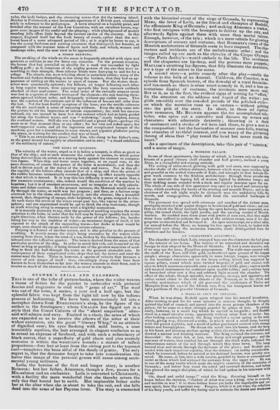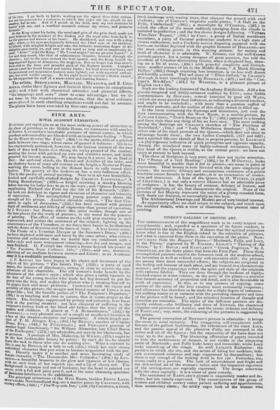BULWICR'S LEILA AND CALDERON.
THIS is one of the tribe of picture-books, where the writer weaves a tissue of fiction for the painter to embroider with pictorial fancies and engravers to stud with " gems of art." The woof was out of the loom, it seems, a year and a half ago; but the splendid fabric was kept from the light till now by the tedious process of bedizening. We have been unconsciously led into a metaphor drawn from EVERINGTON'S shop, by the figure of the author in the frontispiece ; whom CHALON has fogged out in a style that the Count Calicots of the " shawl emporium " afore- said will admire and envy. Exalted in a chair, the arms of which are expanded so as to receive the elbows of the sitter at their widest extension, sits the great " literary Whig," in an attitude of dignified ease; his eyes flashing with mild lustre, a nose irresistibly aquiline, the hair arranged in elegant confusion so as to reveal an expanse of forehead, and with such a redundancy of black cravat, that a superfluity of gold chain and pins scarcely restrains it within the waistcoat's bounds : a stature of tallest proportions—four feet at least from the sitting part to the topmost curl—completes the beau ideal of the dandy of genius. The only regret is, that the decorator forgot to take into consideration the havoc this image of the personal graces will cause among senti- mental young milliners.
Leila, the heroine of the first and longer story, is another Rebecca; but her father, Almamen, though a Jew, passes for a Mussulman and an enchanter. Leila is converted to Christianity, with a facility the more wonderful that she thereby severs the only ties that bound her to earth. Her implacable father stabs her at the altar when she is about to take the veil, and she falls dead into the arms of her Paynim lover. The story is connected A MOORISH PALACE.
In one of those apartments, the luxury of which is known only to the inha- bitants of a genial climate (half chamber and half grotto), reclined a young ltloor, in a thoughtful and musing attitude. The ceiling of cedar-woad, glowing with gold and azure, Was supported by slender shafts of the whitest alabaster, between which were open arcades, light
and graceful as the arched vineyards of Italy, and wrought in that delicate Mi. gree work common to the Arabian architecture: through these arcades WeI seen at intervals the lapsing fall of waters, lighted by alabaster lamps; and their tinkling music sounded with a fresh and regular murmur upon the ear. The whole of one side of this apartment was open to a broad and extensive bal. cony, which overhung the banks of the winding and moonlit Datro ; and in the
clearness of the soft night might be distinctly seen the undulating hills, the woods and orange•groves, which still form the unrivalled landscapes of Granada.
Tire pavement was spread with ottomans and couches of the richest azure, prodigally ern kited with quaint designs in broideries of gold and silver; and over that on which the Moor reclined, facing the open balcony, were suspended, on pillar, the round shield, the light javelin, and the curving cimiter of Moorish warfare. So studded were these arms with jewels of rare cost, that they might alone have sufficed to indicate the rank of the evident owner, even it his own gorgeous vestments had riot betrayed it. An open manuscript, on a silver table, lay unread before the Moor, as, leaning his face upon his hand, 1w looked with abstracted eyes along the mountain summits, dimly distinguished from the cloudless and far horizon.
AN ENCHANTER'S APARTMENT.
The chamber into which Leila retreated bore out the characters she had given of the interior of her home. The fashion of its ornament and decoration was foreign to that adopted by the Moors of Granada. It had a more massive, and, if we may use the term, Egyptian gorgeousness. The walls were covered with the stuffs of the East, still with gild, embroidered upon ground of the deepest purple ; strange characters, apparently in sonic foreign tongue, were wrought in the tesselated cornices and on the heavy ceiling, which was supported by square pillars, round which were twisted serpents of gold and enamel, with eyes to which enormousemeralds gave a green and lifelike glare ; various scrolls and musical instruments lay scattered upon marble tables; and a solitary lamp of burnished silver cast a dim and subdued light around the chamber. The effect of the whole, though splendid, was gloomy, strange, and oppressive, and rather suited either to the cold climate of the Norman, or to the thick and cavelike architecture which of old protected the inhabitants of Thebes and Memphis from the rays of the African sun, than the transparent heaven and light pavilions of the graceful Orientals of Granada.
A MAGICAL COLT' DE THEATP.E.
When he was alone, Boabdil again relapsed into his wonted irresolution. After striding to and fro fur some minutes in anxious thought, he abruptly quitted the hall of council, and passed into the more private chambers of the palace, till he came to a door strongly guarded by plates of iron. It yielded easily, however, to a small key which he carried in his girdle ; and Boabdil stood in a small circular room, apparently without other door or outlet: but, after looking cautiously round, the King touched a secret spring in the wall, which, giving way, discovered a niche, in which stood a small lamp, burning with the purest naphtha, and a scroll of yellow parchment covered with strange
letters and hieroglyphics. He thrust the scroll into his bosom, took the lamp in his hand, and pressing another spring within the niche, the wall receded and showed a narrow and winding staircase. The King reelosed the entrance, and descended : the stairs led, at last, into damp and rough passages ; and the murmur of waters, that reached his ear through the thick walls, indicated the subterranean nature of the soil through which they were hewn. The lamp burned clear and steady through the darkness of the place ; and Boabdil pro. ceeded with such impatient rapidity, that the distance (in reality considerable which he traversed, before he arrived at his destined bourne, was quickly mew. sured. He came, at last, into a wide cavern, guarded by doors as concealed and secret as those which had screetoel the entrance from the upper air. He was in one of the many vaults which made the mighty cemetery of the monarchs of Granada ; and before him stood the robed and crowned skeleton, and before him glowed the magic dial•plate, of which he had spoken in his interview with Muza.
Oh, dread and awful image !" cried the King, throwing himself on his knees before the skeleton, "shadow of what was once a king, wise in council, and terrible in war ! if in those hollow bones yet lurks the impalpable and um seen spirit, hear thy repentant son. Forgive, while it is yet time, the rebellion of his fiery youth, and suffer thy daring soul to animate the doubt and weakoess
who first intrigues with the besiegers to deliver up the city, and afterwards fights against them with snore than mortal valour. Enough, however, of the tale ; which is a mere vehicle for glowing
descriptions of scenery and costume, that ROBERTS'S views of the
- Moorish architecture of Granada seem to have inspired. The cha-
racters and incidents are of the melodramatic order ; and the images called up are such as the chivalry of the Cirque Olympic —the Paris Astley's--would embody to the life. The sentiment and the eloquence are lip-deep, and the persons mere Puppets; MACLISE'S strutting lay-figures, that fitly illustrate the narrative, are a type of the actors in the scene. A second story—a petite comedy after the play—swells the volume to the bulk of an Annual. Calderon, the Courtier, is an episode from Spanish history, of the downfal of a royal favourite: and inasmuch as there is some court comedy in it, and a less os- tentatious display of costume, the incidents seem more real. But in it, as in the first, the evident signs of writing for "effect," fix the attention on the address and esprit of the writer: you glide smoothly over the rounded periods of the polished style— on which the narrative runs as on castors — without getting into the pith of the story. In short, in these ad captan. dum romances, Mr. BULWER appears the too accomplished tale- teller, who spins out a narrative and dresses up scenes and characters with admirable dexterity ; throwing in a dash of sentiment and a stroke of wit here and there, to give a zest to the composition: but the fascination of manner soon fails, wanting the stimulus of truthful interest, and you weary of the glittering throng of ideas that " play round the head but never reach the heart."
As a specimen of the descriptions, take this pair of " interims; and a scene of magic.
with the historical event of the siege of Granada, by representing Muza, the lover of Leila, as the friend and champion of Boabdil, the effeminate King of Granada ; and making Almamen a traitor,
of hisoan. I go forth to battle, waiting not the signal thou' didst ordain. Let out the penance fur a rashness, to which fate urges me on, attach to my odotry, but to me. Aud if 1 perish in the field, may my evil destinies be buried with me, and a worthier monarch redeem my errors, and preserve
Granada P+ As the King raised his looks, the unrelaxed grin of the grim dead, made yet
sore hideous by the mockery of the diadem and the royal robe, froze back to Ire the passion and sorrow at his heart. He shuddered, and rose with a deep sigh; whet), ns his eyes mechanically followed the lifted arm of the skeleton, he beheld, with mingled delight and awe, the hitherto motionless finger of the &Wale pass slowly on, and rest at the word so long and so impatiently de- 1ired, "Arise!" cried the King. " Do I read aright? are my prayers heard ?" A low sad deep sound, like that of subterranean thunder, boomed through the chamber ; and in the same instant the wall °petted, and the King beheld the lopg.expected figure of Almamen, the magician. But no longer was that stately form clad in the loose and peaceful garb of the Eastern canton. Complete armour eased his broad breast and sinewy limbs ; hie head alove was bare; and his prominent and impressive features were lighted, not with mystical enthuai. sso, but with warlike energy. In his right 11;11141 he carried a drawn sword; Lis left supported the staff of a snow-white and dazzling banner.
The artists, STEPHANOFE, MACLISE, MEADOWS, and E. COR- BOULD, clothe their figures and furnish their scenes in sumptuous style ; and what with theatrical attitudes and pictorial effects, "tbe trappings and suits" show to some advantage : but we do not trace in the countenances emotions, that the most ordinary actors placed in such startling situations could not fail to assume. 'The plates have been executed by first-rate engravers.



























 Previous page
Previous page